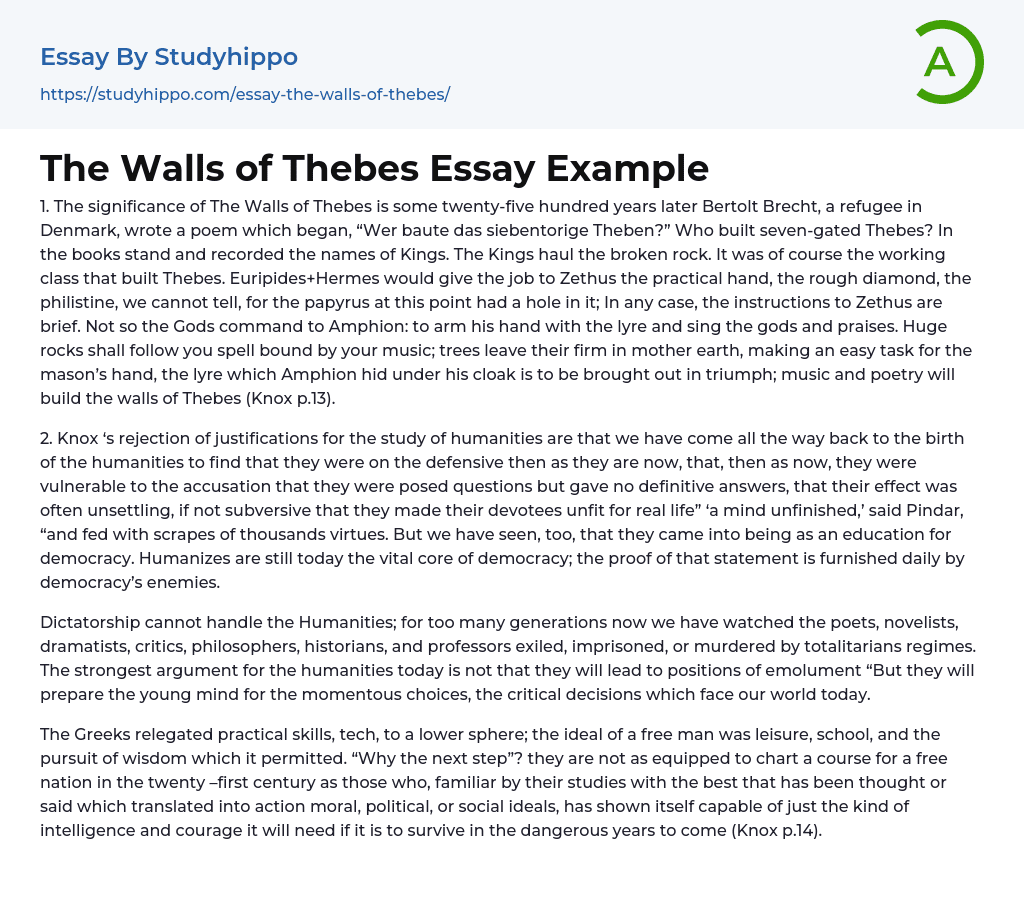1. The significance of The Walls of Thebes is some twenty-five hundred years later Bertolt Brecht, a refugee in Denmark, wrote a poem which began, “Wer baute das siebentorige Theben?” Who built seven-gated Thebes? In the books stand and recorded the names of Kings. The Kings haul the broken rock. It was of course the working class that built Thebes. Euripides+Hermes would give the job to Zethus the practical hand, the rough diamond, the philistine, we cannot tell, for the papyrus at this point had a hole in it; In any case, the instructions to Zethus are brief. Not so the Gods command to Amphion: to arm his hand with the lyre and sing the gods and praises. Huge rocks shall follow you spell bound by your music; trees leave their firm in mother earth, mak
...ing an easy task for the mason’s hand, the lyre which Amphion hid under his cloak is to be brought out in triumph; music and poetry will build the walls of Thebes (Knox p.13).
2. Knox ‘s rejection of justifications for the study of humanities are that we have come all the way back to the birth of the humanities to find that they were on the defensive then as they are now, that, then as now, they were vulnerable to the accusation that they were posed questions but gave no definitive answers, that their effect was often unsettling, if not subversive that they made their devotees unfit for real life” ‘a mind unfinished,’ said Pindar, “and fed with scrapes of thousands virtues. But we have seen, too, that they came into being as an education fo
democracy. Humanizes are still today the vital core of democracy; the proof of that statement is furnished daily by democracy’s enemies.
Dictatorship cannot handle the Humanities; for too many generations now we have watched the poets, novelists, dramatists, critics, philosophers, historians, and professors exiled, imprisoned, or murdered by totalitarians regimes. The strongest argument for the humanities today is not that they will lead to positions of emolument “But they will prepare the young mind for the momentous choices, the critical decisions which face our world today.
The Greeks relegated practical skills, tech, to a lower sphere; the ideal of a free man was leisure, school, and the pursuit of wisdom which it permitted. “Why the next step”? they are not as equipped to chart a course for a free nation in the twenty –first century as those who, familiar by their studies with the best that has been thought or said which translated into action moral, political, or social ideals, has shown itself capable of just the kind of intelligence and courage it will need if it is to survive in the dangerous years to come (Knox p.14).
- Book Summary essays
- Metaphor essays
- Reader essays
- Rhyme essays
- Literary devices essays
- Villain essays
- Books essays
- Genre essays
- Literary Criticism essays
- Writer essays
- Protagonist essays
- Simile essays
- Poem essays
- Book Report essays
- Book Review essays
- Greek Mythology essays
- Plot essays
- Tragic Hero essays
- Coming of Age essays
- Play essays
- Rhetoric essays
- Rhetorical Question essays
- Translation essays
- Understanding essays
- Reason essays
- Character essays
- Letter essays
- American Literature essays
- Literature Review essays
- Utopia essays
- Poetry Analysis essays
- Dante's Inferno essays
- Between The World and Me essays
- Incidents in The Life of a Slave Girl essays
- Flowers for Algernon essays
- Myth essays
- Everyday Use essays
- Boo Radley essays
- Genesis essays
- Richard iii essays
- Alice in Wonderland essays
- On the road essays
- Ozymandias essays
- The Nightingale essays
- Holden Caulfield essays
- Animal Farm essays
- 1984 essays
- A Hanging essays
- Shooting An Elephant essays
- A Tale Of Two Cities essays




